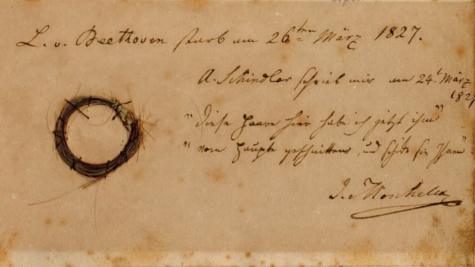DNA Analysis of Beethoven’s Hair Reveals Medical Discoveries––and a Family Secret
March 31, 2023
The year was 1827. Ludwig van Beethoven, a composer who took musical compositions to otherworldly levels, was at the age of 56, suffering with immense pain and edging closer to his death. The musical genius was known for his abounding health problems, including his infamous deafness, liver diseases, and heart problems. Beethoven’s hearing loss bewildered many during his time. Many wondered how he was able to compose hundreds of musical works with this barrier. In fact, it seemed that this fact even mystified Beethoven himself who wrote a letter in 1802 requesting that his condition be studied by his doctor, Johann Schmidt, after his death.
According to the New York Times a day after Beethoven’s death, a group of doctors performed craniotomy on his skull, hoping to find a logical conclusion to how the revered composer had first lost his hearing, and to discover the origins of his various medical conditions. In the following years, numerous analyses followed on Beethoven’s skull and his remaining hair, and a plethora of investigations were done to an extent where an official report stated that his skull could not fit together due to all the dissections. What these researchers did not realize was that this series of genomic analyses would lead to the discovery of Beethoven’s genetic origins and his dark family secret.
The study, which was published in the journal Current Biology , analyzed eight locks of Beethoven’s hair samples from public and private collections across the UK, United States, and Europe. Out of the eight samples, the researchers deemed five of these samples as authentic, and began sequencing his genome to high coverage.
Genetic Discoveries
The genetic analysis was able to detect many of the causes of Beethoven’s health issues. The study’s coauthor, Krause, stated that while they were unable to detect a definitive cause for his deafness or gastrointestinal issues, “we did discover a number of significant genetic risk factors for liver disease. We also found evidence of an infection with Hepatitis B virus in at latest the months before the composer’s final illness. Those likely contributed to his death.” The data was able to help researchers eliminate other potential causes of his illnesses, including celiac disease, lactose intolerance, and irritable bowel syndrome (IBS), which the researchers regarded as “a highly unlikely candidate for the cause of his death.”
Among several liver disease risk factors that were found in Beethoven’s DNA, a leading variant commonly found was that he was a heavy drinker. Initially perceived from letters to his friends, Beethoven is commonly believed to have been a heavy drinker, with a close friend writing that he consumed at least a liter of wine with his lunch on a daily basis. “If his alcohol consumption was sufficiently heavy over a long enough period of time, the interaction with his genetic risk factors presents one possible explanation for his cirrhosis,” stated lead study author Tristan Begg, a Ph.D. student at the University of Cambridge.

A Family Secret
While working towards uncovering the origins behind Beethoven’s maladies, the research crew was also able to cover an untold secret. This astounding revelation came when researchers compared Beethoven’s DNA to that of his known extended family living in Belgium, where they determined an incomplete match, as stated by WSJ. To be exact, some of Beethoven’s relatives shared a paternal ancestor through their family tree from the 1500s and 1600s, which passed down a Y-chromosome by generation. However, the Y-chromosomes that were passed down among Beethoven’s male relatives did not match one other, nor the DNA of Beethoven.
This suggests that through generations, there was a confidential affair that occurred on the father’s side of Beethoven’s family, leading to the birth of a child with a different father than from the extramarital marriage. Maarten Larmuseau, one of the study’s co-authors, suspected that this affair may have stemmed from Beethoven’s grandfather while noting that Beethoven’s father and grandfather had a difficult relationship throughout Beethoven’s childhood.
Beethoven also possessed hardships with his own father, which researchers think may have contributed to his stress throughout most of his lifetime. He stated, “Through the combination of DNA data and archival documents, we observed a discrepancy between Ludwig van Beethoven’s legal and biological genealogy.”
Concluding Thoughts
Despite the valuable information gathered from this study of Beethoven’s genetic codes, researchers were still unable to fully conclude the cause of Beethoven’s hearing loss for almost his whole lifetime. Nevertheless, it goes without saying that this study was a revolutionary step forward to answering the question.
William Meredith, a Beethoven scholar who was involved in the project for decades, described the project as an incredible feat, stating that, “The whole complex story is astonishing to me, and I’ve been part of it since 1994. One finding just leads to another unexpected finding.”


















































































































































